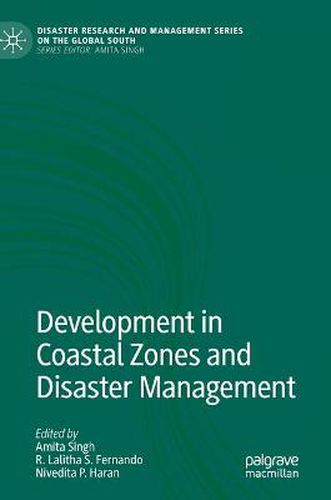Readings Newsletter
Become a Readings Member to make your shopping experience even easier.
Sign in or sign up for free!
You’re not far away from qualifying for FREE standard shipping within Australia
You’ve qualified for FREE standard shipping within Australia
The cart is loading…






This title is printed to order. This book may have been self-published. If so, we cannot guarantee the quality of the content. In the main most books will have gone through the editing process however some may not. We therefore suggest that you be aware of this before ordering this book. If in doubt check either the author or publisher’s details as we are unable to accept any returns unless they are faulty. Please contact us if you have any questions.
In the last two decades, coastal regions have relatively endured some of the fiercest oceanic and geophysical disasters than the earlier decades. Yet, disaster management governance fails to match the human, nonhuman and environmental calamity which is unfolding in its most frequent and unpredictable pattern. Between the Asian Tsunami of 2004 to the devastating Chennai and Kerala floods of 2018 the socio-industrial-livelihood impact alerts governments towards a greater and more serious compliance to laws for coastal conservation. The United Nations Office for Disaster Risk Reduction (UNDRR) in 2018 had shocking statistics to share as the deaths and damages related to only Tsunami disaster at the coasts to 251,770 and US$280 billions respectively in the last 20 years (1998-2017) as compared to 998 and US$ 2.7 billion in the previous 20 years (1978-1997). Coastal conservation is no more a question of casual governance but has become a need for survival. The region of South Asia which ranks much higher in its vulnerability, weak resilience and relatively undersupplied governance structures ought to take this responsibility on a priority. The spirit of Hyogu Declaration and the Sendai Framework for Action suggests preparedness and resilience building as key approach areas in coastal governance.
The book is incomparable in its holistic and transdisciplinary social science based approach to disaster management which links conservation of marine flora and fauna, ecosystems and land management with decision making processes and coastal regulations. These grass root findings from the subcontinent are substantiated by a section on the most powerful court battle on the Kerala Floods as a guideline for readers to discerningly identify an ‘Act of God’ often used as a veil to hide lack of preparedness, apathy and political greed. This book becomes indispensable reading for anyone involved in research, administration or any level of decision making for the mitigation and prevention of disasters.
$9.00 standard shipping within Australia
FREE standard shipping within Australia for orders over $100.00
Express & International shipping calculated at checkout
This title is printed to order. This book may have been self-published. If so, we cannot guarantee the quality of the content. In the main most books will have gone through the editing process however some may not. We therefore suggest that you be aware of this before ordering this book. If in doubt check either the author or publisher’s details as we are unable to accept any returns unless they are faulty. Please contact us if you have any questions.
In the last two decades, coastal regions have relatively endured some of the fiercest oceanic and geophysical disasters than the earlier decades. Yet, disaster management governance fails to match the human, nonhuman and environmental calamity which is unfolding in its most frequent and unpredictable pattern. Between the Asian Tsunami of 2004 to the devastating Chennai and Kerala floods of 2018 the socio-industrial-livelihood impact alerts governments towards a greater and more serious compliance to laws for coastal conservation. The United Nations Office for Disaster Risk Reduction (UNDRR) in 2018 had shocking statistics to share as the deaths and damages related to only Tsunami disaster at the coasts to 251,770 and US$280 billions respectively in the last 20 years (1998-2017) as compared to 998 and US$ 2.7 billion in the previous 20 years (1978-1997). Coastal conservation is no more a question of casual governance but has become a need for survival. The region of South Asia which ranks much higher in its vulnerability, weak resilience and relatively undersupplied governance structures ought to take this responsibility on a priority. The spirit of Hyogu Declaration and the Sendai Framework for Action suggests preparedness and resilience building as key approach areas in coastal governance.
The book is incomparable in its holistic and transdisciplinary social science based approach to disaster management which links conservation of marine flora and fauna, ecosystems and land management with decision making processes and coastal regulations. These grass root findings from the subcontinent are substantiated by a section on the most powerful court battle on the Kerala Floods as a guideline for readers to discerningly identify an ‘Act of God’ often used as a veil to hide lack of preparedness, apathy and political greed. This book becomes indispensable reading for anyone involved in research, administration or any level of decision making for the mitigation and prevention of disasters.